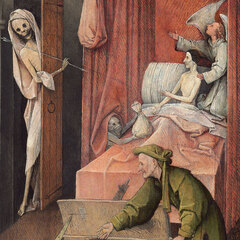|
I recently had the chance to do something you'll now never get to do. That's read "Death and the Miser" by Jeff Fearnside over at Plume Journal without having first viewed the Hieronymus Bosch painting on which the poem is based. Setting aside this now remedied gap in my education for a moment, let me say, like most of you out there, I'm a big fan of ekphrasis. Poetry and painting, in particular, seem to be a match made in Heaven, so I'll just let that speak for itself as we turn to Fearnside's poem. (Click the pic above to read the full text.) In an ekphrastic poem, we routinely expect to be dazzled by color, images, passion, and other painterly devices. Not so, in this case. The poem starts in a prosy, almost banal way: When death comes, it all goes: the fine clothing, chest of treasures, And continues on in this fashion, listing all the losses anyone would expect to see in a poem about death. Nothing eye-catching or spine tingling to be seen as we dig further down into the poem, deeper in the grave, so to speak. We then reach what is almost a transliteration of the images on the canvas: Death’s minions see it all. One peers from above the death bed’s canopy. You're now wondering: why is this poem about death so...boring? So far, anyway. Well, Fearnside has a point and it's a brilliant one. When we reach the seventh stanza (yes, Holy Seven), the dolor breaks away thunderously and we wake to sudden revelation: Your one hope is the angel behind you, hand on your pale, bony shoulder, eyes on the beam of light from the high window with the crucifix. Now this is not only original; it's startlingly original. You'll need to read the closing lines to get the full effect of the turn in stanza seven, but you can surely see now that the poem is epiphanic, just as Bosch's painting. What they're both saying is that death, despite all the hype, is really just another banal, materialistic illusion. It's the angel waiting to take you to a higher life that's the exciting part. But to follow your angel, you'll need to put away your money, your "wasted gut," and your whole earthly life. So, a neatly effective ekphrastic poem that's as much an allusion to the great vanitas painting traditions of the past as it is to this specific painting by Borsch. So why am I lucky that I didn't see the painting before I read the poem? To get an angle for this post, of course! Categories All
0 Comments
Your comment will be posted after it is approved.
Leave a Reply. |

